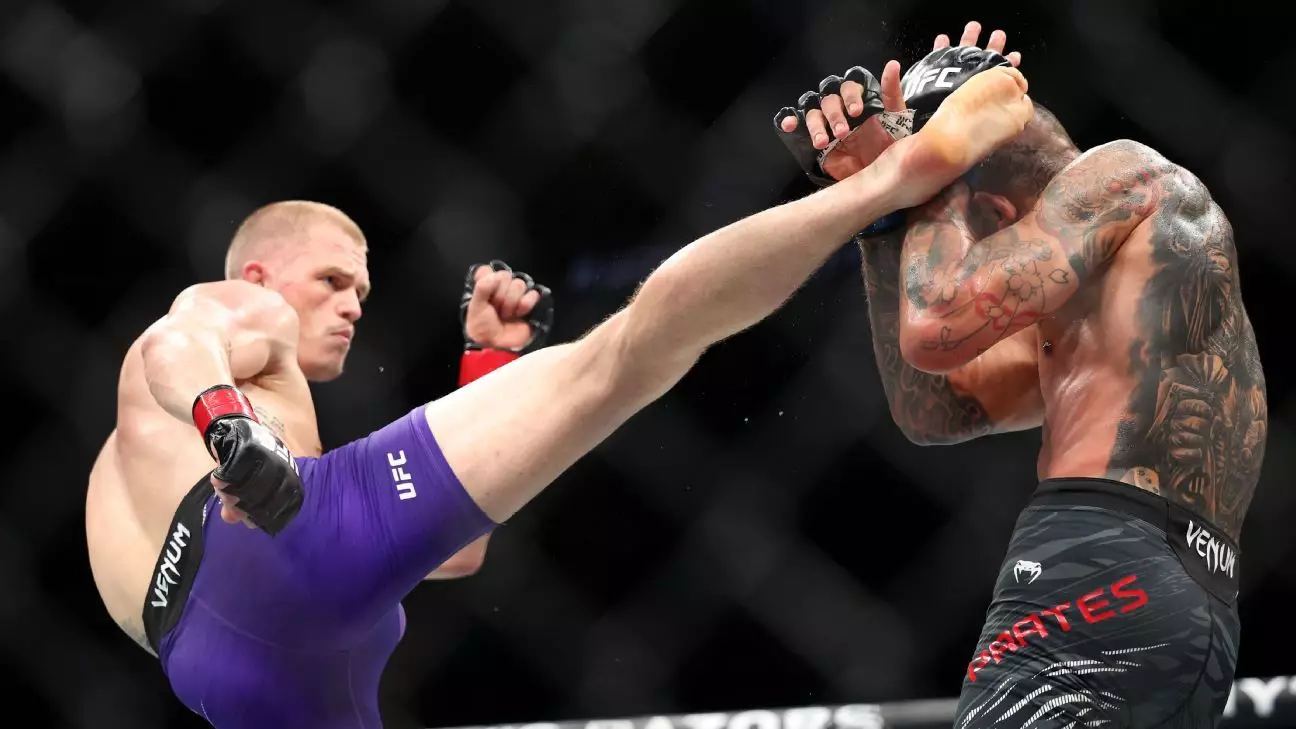This past Saturday, Ian Machado Garry faced an immense challenge when he took on Carlos Prates at UFC Fight Night in Kansas City. The bout was not just another fight; it was a pivotal moment for both competitors. Garry entered the octagon with a record of 16 wins and merely 2 losses, holding his ground as a prominent figure in the welterweight division. On the other hand, Prates, with a reputation as a Brazilian knockout artist boasting a record of 21-7, was hungry to maintain his undefeated streak in the UFC. Ultimately, Garry emerged victorious but not without enduring a fierce battle that would test his skills, resilience, and tactics.
Strategic Brilliance and Tactical Execution
Throughout the initial four rounds, Garry undeniably showcased his tactical brilliance, leaving little doubt about his UFC caliber. He dominated the striking exchanges, landing a staggering 141 total strikes compared to Prates’ 64. His ability to utilize lateral movement and a counter jab effectively kept Prates on his toes and off-balance. These techniques underscore key elements of modern mixed martial arts: intelligence and adaptability. Garry turned to frequent takedown attempts—19 in total—demonstrating a strategic approach to neutralize Prates’ potent striking ability. Although he only successfully completed four takedowns, each effort served to disrupt the rhythm of Prates’ offense, asserting Garry’s dominance and demonstrating his fight IQ.
In an arena where knockout power can decisively shift momentum, Garry’s mix of striking and grappling established him as a well-rounded fighter. For anyone studying the game, this fight illustrates the importance of having a multifaceted approach. Rather than relying solely on brute strength or knockout power, Garry effectively blended his striking with grappling, making him a more unpredictable opponent.
A Gritty Final Round
As the fight wore on, a noticeable tension filled the air—largely felt during the fifth round. Prates came out with renewed vigor, seemingly hurtling Garry into a state of unease. After sustaining a nose injury in the fourth, it was evident that Garry had to dig deep. He resorted to desperate measures, fishing for takedowns to evade Prates’ striking onslaught. This shift emphasizes an essential attribute of an elite fighter: the capacity to adapt under pressure. Machado Garry may have expressed confidence in his performance, but it was clear that he faced a moment of reckoning, reminding fans and critics alike that no fight, no matter how controlled, is devoid of danger.
Even when the odds seemed to be stacked against him, Garry stood resilient, employing his tactical knowledge to navigate through the pressure points of the fight. The scores—49-46, 48-47, and 48-47—indicated a fight controlled largely by Garry but omit the tension and stakes present in the final moments.
Looking Ahead: The Legacy of Machado Garry
As Garry reflects on his journey thus far, he remains focused on proving his worth in the organization. With an impressive record of 9-1 in the UFC and ambitions to seize the welterweight title, his future looks bright. When a fighter takes bouts on short notice against high-caliber opponents, it reveals both courage and ambition. Garry’s statements about aiming for a title shot, especially as an official backup for the upcoming UFC 315 main event, hint at the relentless pursuit of greatness that defines this new wave of MMA athletes.
The competition in the welterweight division is fierce, and with athletes like Garry rising through ranks, fans can expect thrilling bouts filled with chemistry and strategy. The emergence of fighters from notable camps, such as The Fighting Nerds team to which Prates belongs, illustrates the growing depth and talent within the sport. As Garry heads toward the next chapter in his career, he not only champions his own legacy but also pushes the boundaries of what it means to compete at the highest levels in mixed martial arts.
Ian Machado Garry, the “fighting Irishman,” is a name to watch in the coming years. He is not just proving himself; he’s script-writing a modern legacy.

